Fall openings (Part 1): MJ, Godot, Octet, The Veil, Romeo Pimp, Enormity
The Toronto theatre season is now in full swing, with offerings by Mirvish, Crow’s, Coal Mine and more
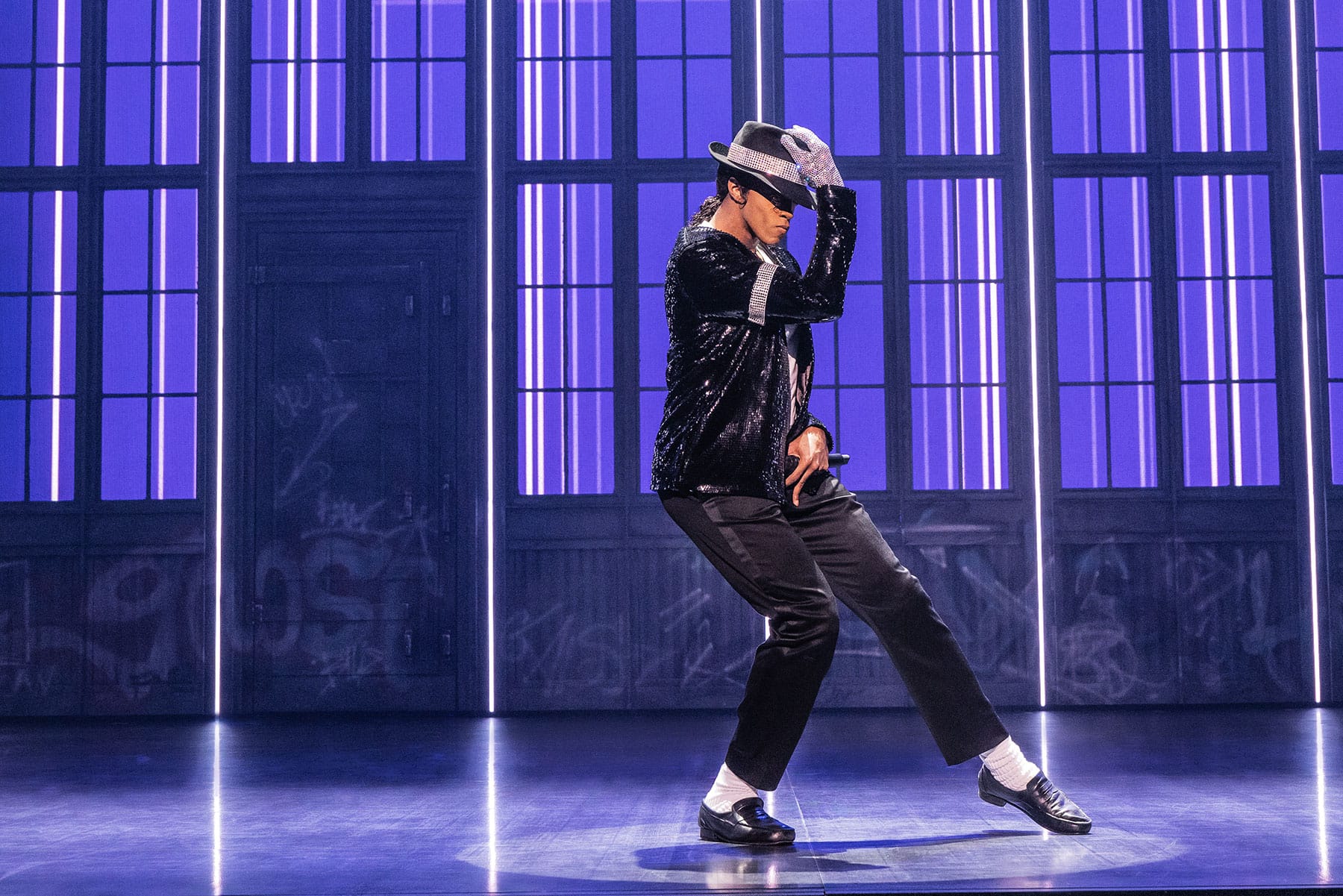
A whopping seven shows opened between September 17 and 20 last week, and in that time the 10-day Just For Laughs Toronto comedy festival also kicked off. So things are busy.
I’ve been doing my best to keep up with them, while also nursing a pesky lower back injury. The one show I haven’t caught yet is the remount of King Gilgamesh, which I loved the first time around. (I hope to see it again before it closes on October 5.)
A bunch more shows open this week, including Makram Ayache’s Governor General’s Award-nominated The Green Line, d’bi.young anitafrika’s Sankofa Trilogy, a revival of Jacob Richmond and Brooke Maxwell’s Ride the Cyclone and the East coast musical Tell Tale Harbour, which has already wowed audiences in PEI.
To keep abreast of all these productions, make sure you check out my Toronto Theatre Listings, which are updated regularly and include extension dates and (where available) reviews. I’ll get to most of them in Part 2 of this roundup, coming next week.
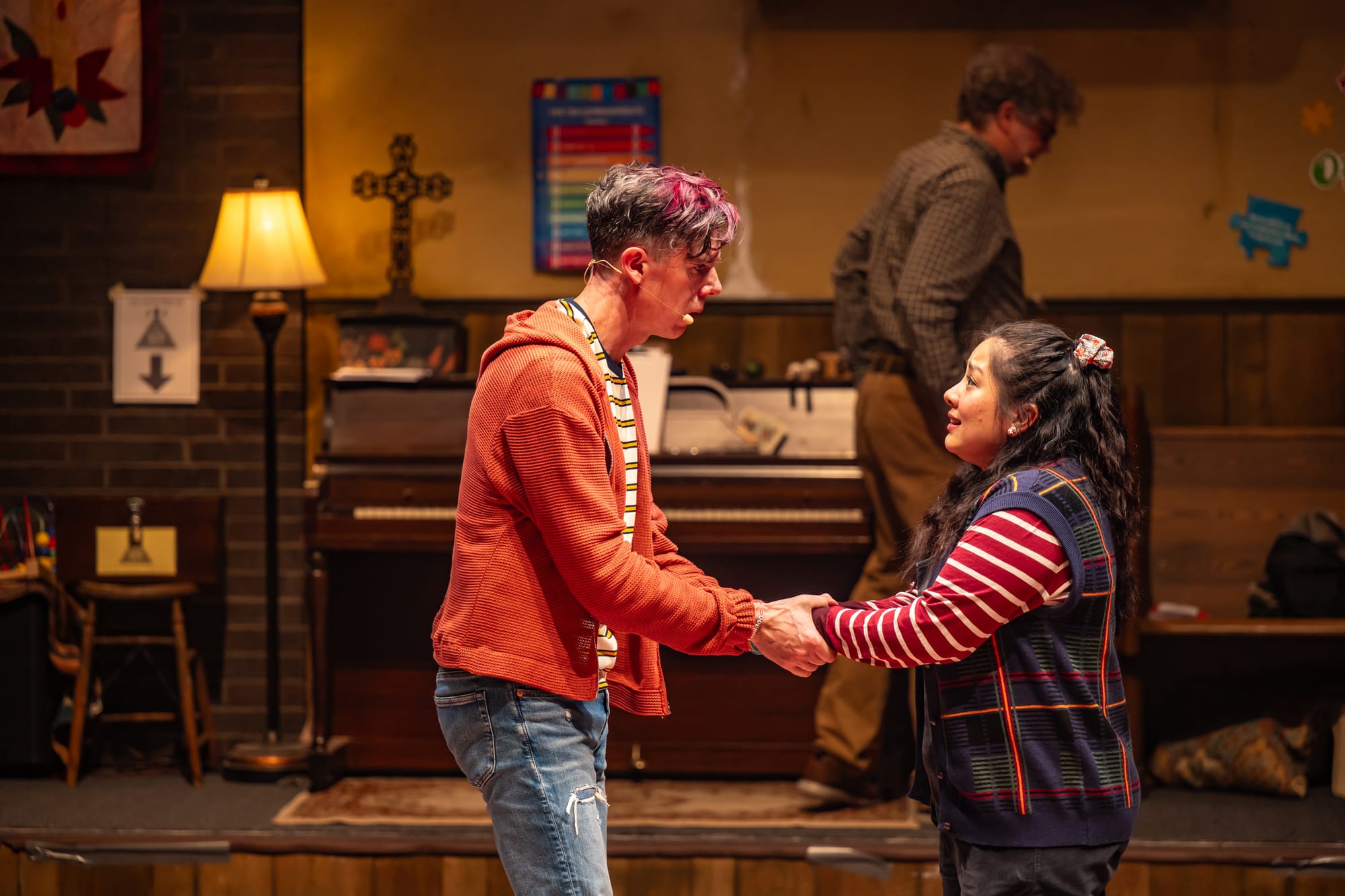
Meanwhile, I reviewed the Crow’s/Soulpepper/Musical Stage Co. production of Dave Malloy’s Octet (Rating: ✭✭✭) last week in the Toronto Star. Although beautifully sung by a terrific ensemble and sharply directed by Chris Abraham, this a cappella musical about eight internet addicts doesn’t have the cohesion, dramatic power or appeal of the Crow’s/Musical Stage Co. monster hit Natasha, Pierre and the Great Comet of 1812. But I still liked it.
I also chatted with the gifted co-founders of Shifting Ground Collective, the upstart indie company that surprised the Toronto theatre community earlier this year by winning three Dora Awards for their charming production of The 25th Annual Putnam County Spelling Bee. They’re reviving Ride the Cyclone this week.
We talked about how they met and shared their love of musical theatre, how they choose shows, and their mandate, which includes creating opportunities for emerging musical theatre artists (onstage and off). There are many Sondheim references in the piece.
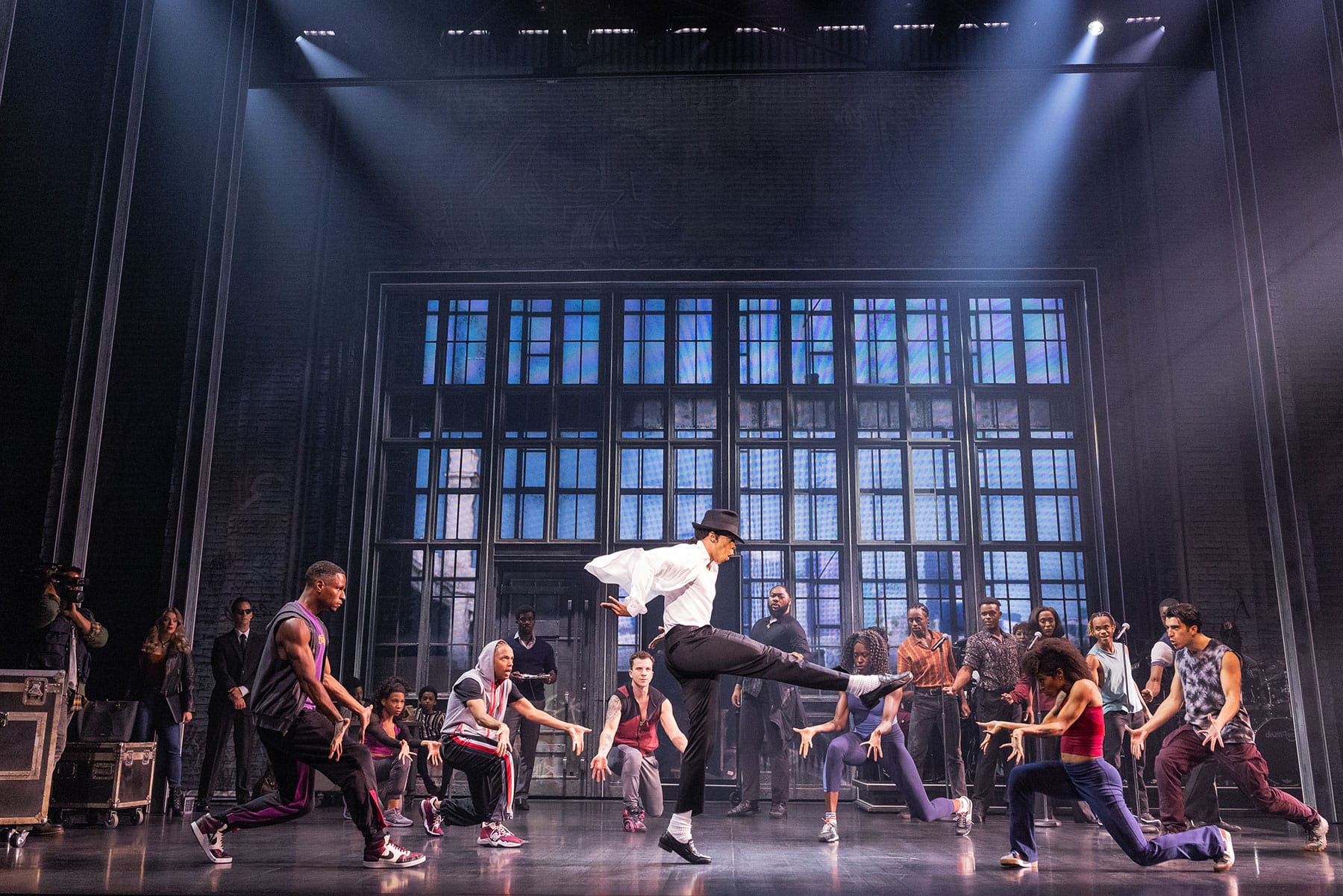
MJ isn’t “dangerous” enough
More than four years after it opened, MJ The Musical (Rating: ✭✭✭) is still going strong on Broadway. And no wonder. As demonstrated in the national tour, which has been travelling across North America since 2023, the show resurrects the music, style, dancing and mystique of the King of Pop without really looking beneath the surface of the man. It moonwalks past any controversy in his past.
It’s 1992, and TV journalist Rachel (Kristin Stokes) and her video operator Alejandro (Kevin Cruz) have been tasked with interviewing and capturing behind-the-scenes footage of MJ (Jordan Markus) as he prepares for his upcoming Dangerous World Tour.
Jackson and his handlers have reluctantly given them the green light, mostly because the tour isn’t selling as well as his previous ones and they need the publicity. The blockbusters Thriller and Bad are in the past, and Jackson has been in physical pain since his infamous Pepsi commercial injury, so he’s been popping pills between rehearsals. The budget for this tour keeps ratcheting up.
The interview structure allows Jackson to reminisce about his childhood and youth with the Jackson 5, working with producers Berry Gordy (J. Daughtry) and then Quincy Jones (Michael Nero), going solo, all while returning to the present to deal with the nitty gritty of putting on a multi-million dollar world tour.
There’s lots of discussion about a bit of stage machinery — called a “toaster” — that will catapult him, like a sprung piece of toast, onto the stage in the show’s opening moment. It will be expensive, and MJ has to decide whether to mortgage his infamous Neverland Ranch to pay for it. That’s kind of it for dramatic tension.
The only interesting thing about double Pulitzer Prize-winning playwright Lynn Nottage’s book for the musical is the observation (familiar to anyone with a passing interest in the artist) that MJ’s father, Joseph (Devin Bowles), was a monstrous bully in the way he raised and managed his gifted children.
He was especially tough on MJ, criticizing the shape of his nose, his masculinity, the colour of his skin. He physically and emotionally abused the boy.
What’s notable here is that Nottage and Wheeldon have cleverly cast the same actor who plays Joseph as MJ’s tour manager Rob, which makes for some very quick and efficient flashbacks to childhood. It also suggests that in a way MJ is using the tour to come to terms with the demons that have haunted him since childhood.
Because the entire enterprise has been produced — and I’m quoting the program — “by special arrangement with the estate of Michael Jackson,” there’s nothing hinting at the sexual abuse allegations (and out-of-court settlements with young boys’ families) that would forever tarnish his reputation. To be fair, those allegations first broke in 1993, a year after the show is set; so perhaps there’s a logical reason for this setting after all.
Markus, taller than the real Jackson, captures the sleek grace, impish charm and vocal cadences of the musical icon. (I have a feeling the sound engineer must be upping his mic levels for his breathy, high-pitched whisper-talk dialogue.)
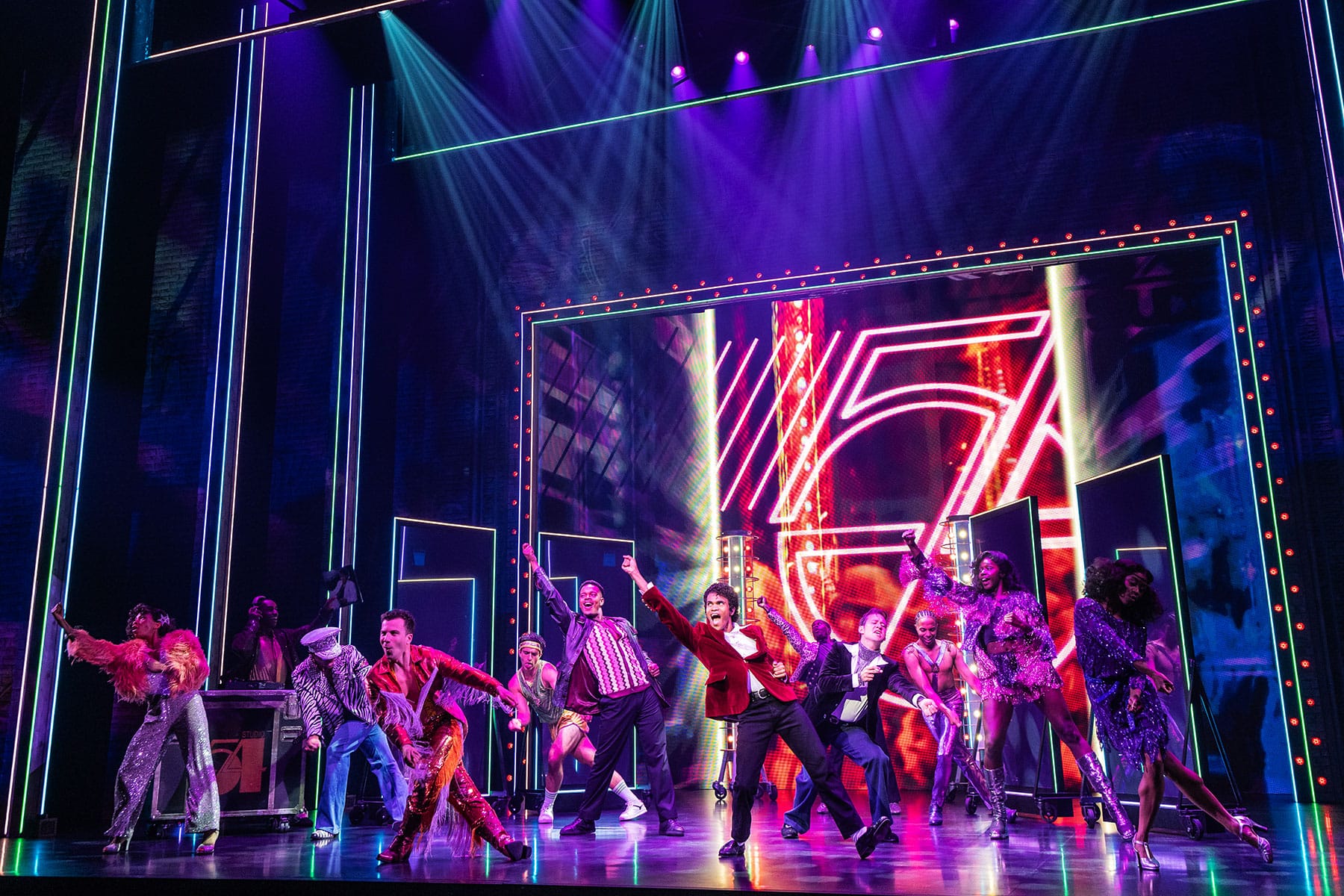
One of the standout sequences is one in which MJ pays tribute to three of his creative inspirations: Fred Astaire, Bob Fosse and the Nicholas Brothers, and Markus gets great support here from the ensemble, who do lots of work throughout the show, constantly changing outfits (by Paul Tazewell) while Peter Nigrini’s projections and Natasha Katz’s sculptural lighting design let us know where we are: a Soul Train taping, amateur night at the Apollo, Studio 54, etc.
As is the convention in some theatrical biographies, the central role is split into several parts. “Little Michael" (Bryce A. Holmes, who alternates in the role with Quentin Blanton Jr.) is the youngest version, while “Michael,” played by Brandon Lee Harris, is the teen singer. Harris delivers a phenomenal performance as this middle version of the star; his singing and acting feel more spontaneous than the cautious, more elusive approach Markus takes — or is asked to take.
If you go in wanting a concert of Michael Jackson songs, with some slick choreography and production values, you won’t be disappointed. Alas, theatre — even the kind featuring a jukebox of hits — can do so much more.
MJ The Musical continues at the CAA Ed Mirvish Theatre (244 Victoria) until Nov. 2. Ticket details here.
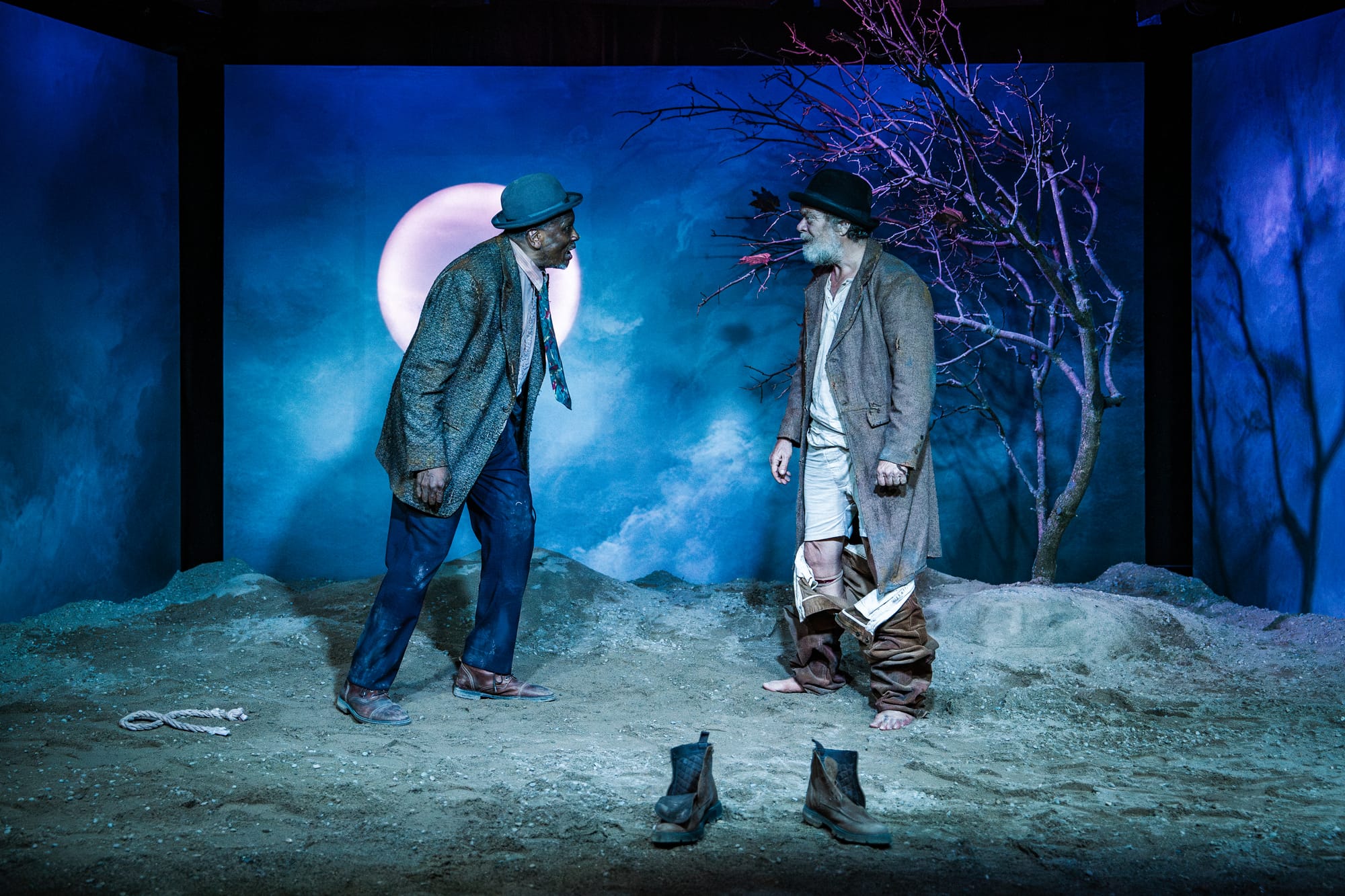
Great Godot
During the pandemic lockdowns, I remember thinking that when live theatre returned, I would most crave absurdist theatre. Naturalistic settings and well-written plots thrive on TV. What theatre does uniquely best is work in metaphor: two down-and-out clowns endlessly waiting for something; a woman buried up to her neck recounting her life.
We’re getting Samuel Beckett’s Happy Days — the latter play — next year from Soulpepper. And I just saw on social media that Why Not Theatre has begun to workshop a new production of his Endgame. Thrilling news.
But first out of the gate is Coal Mine Theatre’s clear and effective production of his iconic Waiting For Godot (Rating: ✭✭✭✭). Watching it should be required viewing for any serious theatregoer.
Bowler-hatted vagabonds Estragon (Ted Dykstra) and Vladimir (Alexander Thomas) meet by a leafless tree and pass the time waiting for the eponymous Godot. Soon they’re joined briefly by the whip-wielding Pozzo (Jim Mezon), who’s got the silent, subordinate Lucky (Simon Bracken) attached to a rope. Day turns into night, and eventually a boy (Kole Parks) informs the clowns that Godot won’t be arriving, but will be the next day.
The second act is a variation on that, with the Pozzo-Lucky dynamic altered and the boy not recognizing Estragon and Vladimir. Intriguingly, there are a couple of leaves on the barren tree.
Director Kelli Fox offers up a clear, accessible production. She and the actors trust the material: its bleak existentialism, its despair, but also its humour. I’ve always thought there was something of the music hall about the play, and Thomas’ Vladimir plays that up nicely, often coming downstage and speaking archly as if to fill us in on some secret. (In his first appearance he appears with his fly undone — a lowbrow joke that works well. It also echoes Estragon’s pants-dropping scene later on.) There are even vaudeville-esque routines involving hats.
Dykstra’s Estragon, who begins the play at a low point — he spent the previous night in a ditch and was beat up by unknown attackers — is the more pitiable figure. Yet he finds endless variations on the running joke involving the title; like any born clown, he finds the pathos in comedy, and vice versa. He uses his hangdog face and animated voice superbly; when he says, in the second act, “I can’t go on like this,” you feel his utter hopelessness. And yet he does go on.
The play is filled with lines like this that resonate in difficult eras. When, in the second act, Lucky hands the whip to the blustery, blind Pozzo, it’s hard not to think about what’s occurring south of the border.
The Beckett estate has strict guidelines and limitations on stagings, but within those parameters Fox’s design team works miracles. Scott Penner’s set is very much a set, and I like how panels in the back have gaps between them so we can see the actors move towards the stage before they appear. Louise Guinand’s lighting and Michael Wanless’ sound feel as timeless as the script. Ming Wong’s costumes, meanwhile, appear appropriately sweat-stained, distressed and lived-in.
So does this play, which has endured for a reason. If you haven’t seen it before, or you know it well (I’ve seen maybe a handful of productions), it’s worth checking out. Near the end, Vladimir, in one of the most poignant passages, says that he wants to be seen and acknowledged. It’s a legitimate cri de coeur that echoes through the ages.
And it’s as powerful an argument for live theatre as you can get.
Waiting For Godot continues at the Coal Mine Theatre (2076 Danforth) until Oct. 12. Ticket details here.
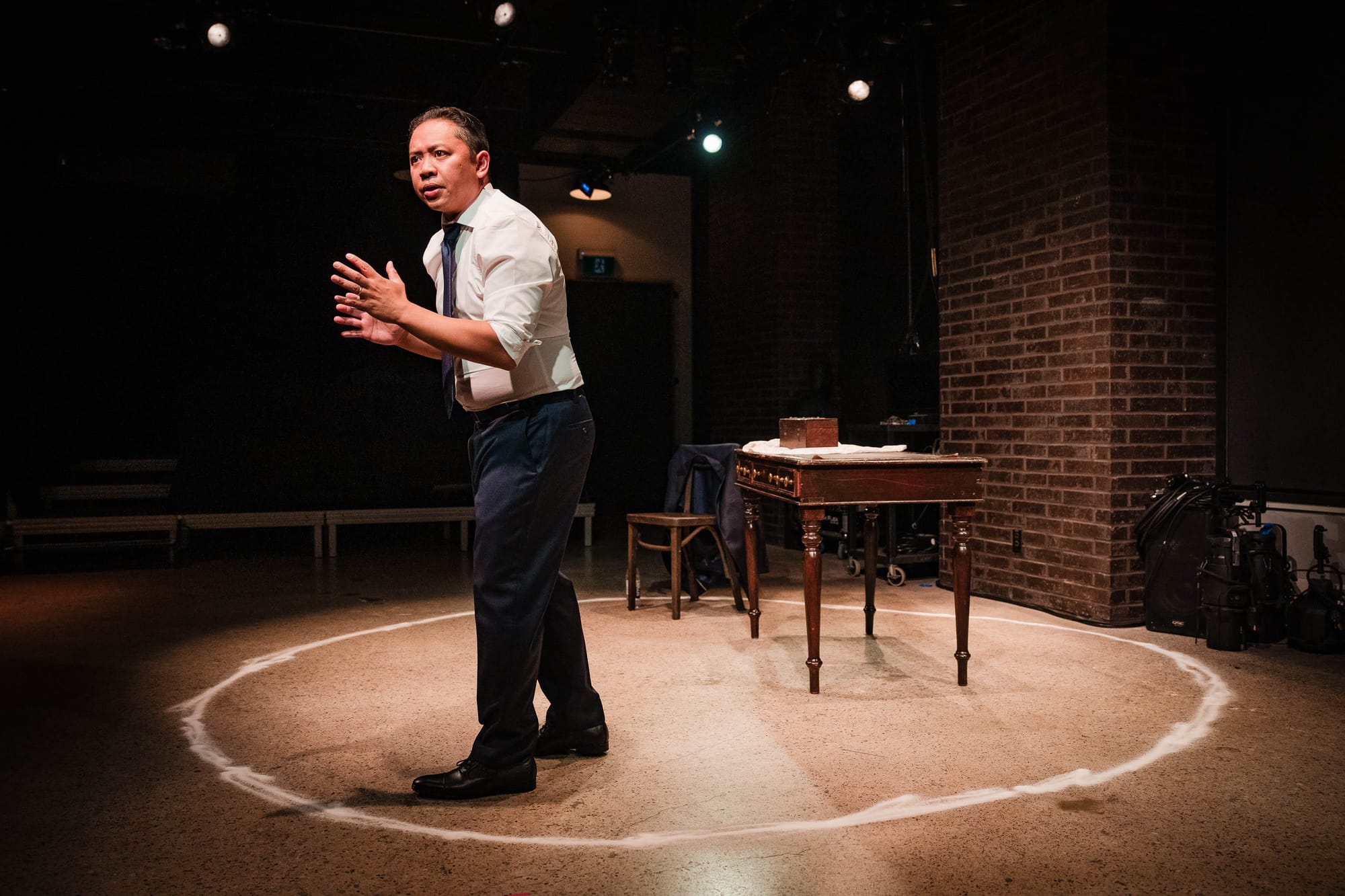
Vivid Veil
When an ambitious lawyer who’s trying to make partner in his firm accepts a Faustian bargain to get ahead, his life begins to fall apart. And then he comes up with a desperate solution to his dilemma.
That’s the simple but entertaining premise of Keith Barker and Thomas Morgan Jones’ The Veil (Rating: ✭✭✭✭), a creepy, atmospheric and beautifully detailed chiller that makes terrific use of the intimate Crow’s Theatre Studio space.
Director Helen Juvonen shows lots of imagination in her staging, starting with the play’s opening moments when an anxious man on the sidewalk (Byron Abalos) looks in the windows (normally hidden with blinds), knocks a few times, and then is let in by the play’s stage manager through a side door.
Surprised at finding so many people inside, he then proceeds to tell us the tale of how he got to where he is now. Placing a small wooden casket on a table and lowering the blinds, he takes a container of salt and, while recounting his story, surrounds himself in a circle. This, it turns out, will be his limited playing area for the rest of the performance. Presumably he’s protected from any supernatural forces.
What follows is a familiar enough story: he’s married and they have a six-year-old child, but he works so much he doesn’t get to spend enough time with them. When a more senior lawyer at his firm tells him about a solution that involves a candle and a sort of passing along of a curse, he humours the man and goes along with it.
And that’s when things start to radically change in his life.
Barker and Jones take a leisurely, but not slack, approach to their story, making The Veil feel like something by a modern-day Poe. Juvonen and her superb design team (set/lighting by Jareth Li, sound by Ashley Naomi) enhance the tale with little jolts of tension.
Some props mysterious shift against the wall; a flash of illumination strikes; and most effectively, sounds from the man’s story bleed into the theatre but could almost be mistaken for ordinary urban noise. The effect is quietly unnerving. Did we just hear something... or was it in our minds?
The text itself is full of chilling details; one in particular, when the man describes coming back to his home only to find every inch of his dwelling rearranged, is especially frightening, and somehow is more effective as storytelling than it would be in a more visual medium like film or TV.
And underlying the text is an intriguing, if underexplored, theme about how one’s worst deeds accumulate and follow you around, hidden by a thin veil.
Abalos, who acts in theatre too infrequently (Banana Boys, Twelve Angry Men), delivers a heart-pounding, nerve-wracking performance. The stakes are high for him as he looks over his shoulder and starts at every little change in his environment. It was a wise decision not to have him even return for a post-show bow; the horror of the situation lingers and stays with us.
Speaking of horror, it’s a shame the producers — Thought For Food, in association with Crow’s and the Guild Festival Theatre — didn’t wait a month and premiere the show around Hallowe’en. Apart from the creepy goings-on a few blocks down at Eldritch Theatre’s Red Sandcastle, there’s too little genre theatre in the city. And there’s definitely a market for it, especially when it’s done as well as it is here.
The Veil continues at Crow’s Studio (345 Carlaw) until October 19 (extended). Ticket details here.
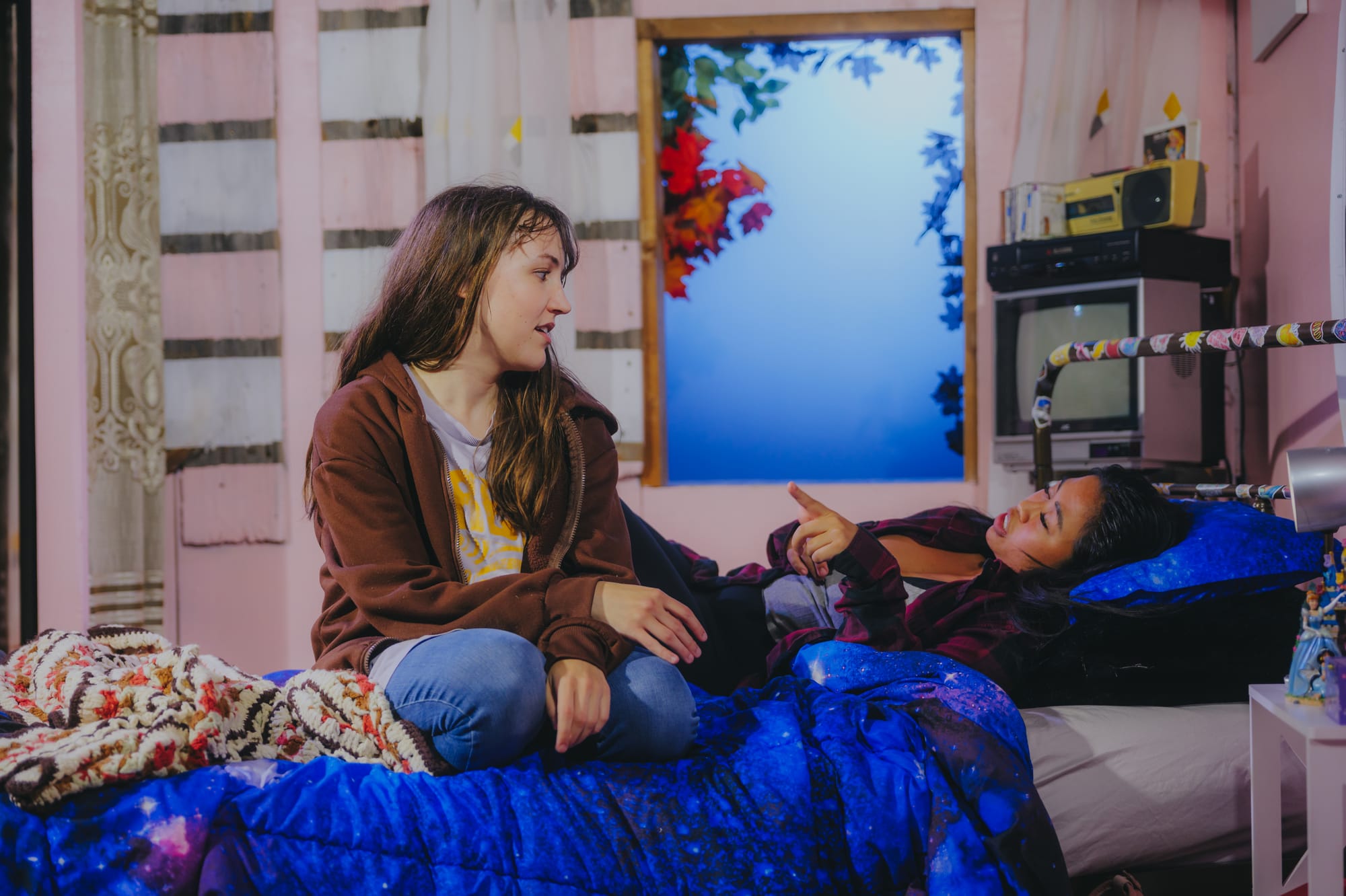
Social ills, contrasting approaches
Two harrowing dramas that debuted last week take on serious social issues in different ways.
Jesse McQueen’s Romeo Pimp (Rating: ✭✭✭✭), the more effective production, explores sexual trafficking through two parallel stories. Jamie (Charlotte Salisbury) is a soft-spoken high-schooler who isn’t quite as confident or outgoing as her bestie Paige (athena kaitlin trinh). With her father working on the road and her mom (McQueen) doing night shifts, she’s also pretty isolated.
So when a friend of her brother’s named Ryan (Agape Mngomezulu) shows interest in her, she quickly finds some self-confidence — and a new friend group.
Meanwhile, Michaela (Juliette Diodati) has already been caught up in trafficking, manipulated by her boyfriend/pimp Shane (Sam Wexler) with promises that they will one day leave their town and open a cafe.
McQueen takes her time establishing both worlds so we get to know the characters well. Director Sophie Ann Rooney moves things efficiently between the two worlds, timing entrances and exits so there’s no pause in the action, and there’s good use of some secondary characters — Brennan Bielefeld as Jamie’s bratty younger brother, and Jack Creaghan as her jokey but sympathetic math teacher — to add texture to Jamie’s life.
McQueen and Rooney are especially adept at illustrating how feelings of guilt and isolation can factor into the trafficking equation.
That said, the show feels a bit too long, and a couple of late monologues seem shoehorned in. Some of the sound design — jagged horror-like stings — also feel unnecessary; the story is so effective it doesn’t need them.
There’s a enough talent on display — in the writing, performances and direction — to make this gut-punch of a play hit home.
I think the King Black Box, in partnership with One East Productions, has found its niche presenting contemporary stories with a disturbing edge.
Romeo Pimp continues at the King Black Box (1224 King West, Unit 300) until Oct. 4. Ticket details here.
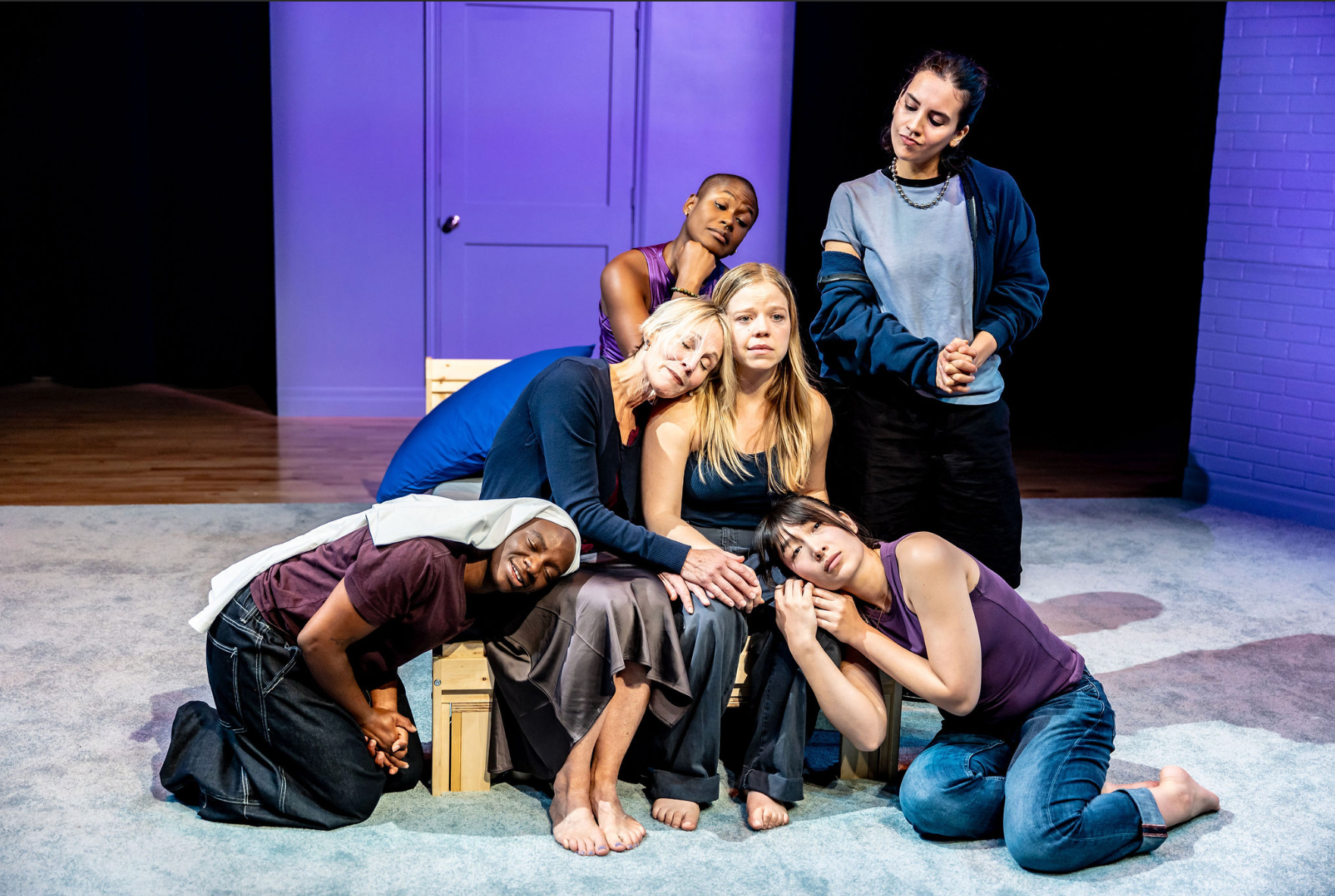
Much further uptown, Nightwood Theatre, in association with Tarragon, present the world premiere of Chelsea Woolley’s Enormity, Girl and the Earthquake in Her Lungs (Rating: ✭✭✭), an ambitious yet frustrating look at how a troubled young woman comes to terms with a lifetime of abuse.
Set in a women’s shelter, the play centres on Vic (Vivien Endicott-Douglas) — which we soon learn is short for “victim.” After she’s asked “How are you?” by someone in intake, Vic considers the implications of that question and spirals out of control as various aspects of her personality try to control her.
What starts out as a barrage of confusing, competing voices soon becomes clearer as these jagged parts of Vic’s being/situation — named Ago (Bria McLaughlin), Ward (Liz Der), Lull (Philippa Domville), Grind (Sofía Rodríguez) and Sham (Emerjade Simms) in the digital program — become better defined.
The idea of fragmented personalities isn’t new. We saw it just last season in Michael R. Jackson’s A Strange Loop. But both Woolley and director Andrea Donaldson make things difficult for the audience by withholding any sort of scene where we can get our bearings.
I’m sure this is meant to suggest the chaos that Vic is going through, but the first half of the play is nevertheless exhausting to sit through. And Woolley doesn’t vary the rhythms of the work with much humour. It’s not until about 50 minutes in where we see a scene at a party — in which Vic’s hard-drinking mother (Domville) controls her while neighbours/friends gossip — that we begin to piece together Vic’s situation.
Some sequences, like one at a therapy session, seem intended to be satirical but feel overwritten and pointless. Others, like a recreation of a car ride from a basketball coach (Simms), provide necessary information — but a little too late.
That said, the actors and designers (especially movement designer Lisa Karen Cox, lighting designer Raha Javanfar and sound designer Cosette ‘Ettie’ Pin) do what the writer and director ask of them and come through with something unique, disturbing and, ultimately, cathartic and moving.
Like the work of Sylvia Plath and Virginia Woolf, both of whom are referenced early on (a little on the nose, perhaps?), this play is layered and complex. It just needs a clearer, more accessible entry point earlier on (and perhaps a better title?) to fully work.
Enormity, Girl and the Earthquake in Her Lungs continues at the Nancy & Ed Jackman Performance Centre (877 Yonge) until Oct. 5. Ticket details here.
Slave Play tickets
Congratulations to Hubert H., who won a pair of tickets to Canadian Stage’s production of Slave Play, Jeremy O. Harris’ controversial play about sex, race and relationships. He correctly answered that Harris was attending Yale University when he initially produced the play. Slave Play runs at the Berkeley Street Theatre from September 27 to October 26. See details here.
